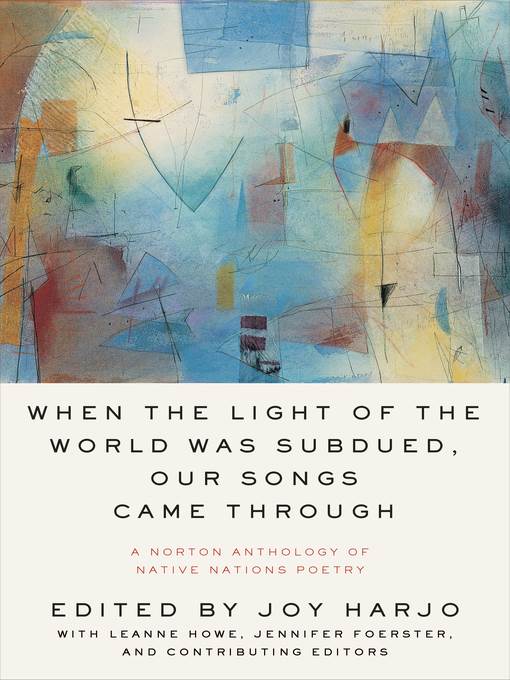
When the Light of the World Was Subdued, Our Songs Came Through
A Norton Anthology of Native Nations Poetry
کتاب های مرتبط
- اطلاعات
- نقد و بررسی
- دیدگاه کاربران
نقد و بررسی

Starred review from June 1, 2020
"There is no such thing as a Native American," declares U.S. poet laureate Harjo, whose decades of writing and activism on the subject of indigenous peoples have generated the most comprehensive and nuanced anthology of Native Nations poetry to date. Harjo's introduction provides historical context for such terms as Native American and American Indian, and clarifies that many poets of Native Nations identify primarily with tribal and cultural affiliations, which have close relationships to their traditional homelands. As such, the anthology groups poets by region, beginning with the Northeast, and moving across the continent, landing finally in the Southeast, with its deadly legacy of forced relocation and genocide. Each of the five sections includes a preface by a poet from the region, which provides further detail about each geographic area. Together with uncredited historical pieces and collectively authored verses, the anthology includes poems by established authors, such as N. Scott Momaday and Leslie Marmon Silko, and showcases emerging voices, like Layli Long Soldier and Natalie Diaz, and also introduces relative newcomers, such as Jake Skeets and Tommy Pico. If there's one poetry anthology that belongs on every bookshelf in this country called America, it's this one.(Reprinted with permission of Booklist, copyright 2020, American Library Association.)

Starred review from August 1, 2020
A celebration of literary riches, this first-of-its-kind anthology of Native American poetry is a great witness to the joy and power of verse. Poet Laureate Harjo, a member of the Muscogee Nation, and her team have selected works from 161 writers and over 90 nations. Because determining who gets called a Native American can be difficult, the editors chose to include only works by enrolled tribal members or poets closely associated with an Indigenous community. Though the earliest poem is an elegy written by Harvard senior Eleazor (1678), much of the book focuses on contemporary and 20th-century poetry. The book is divided geographically into five sections, presenting a kind of journey that starts in the North-east, wanders to Alaska and the Hawaiian Islands, then down through the South and back through the Gulf to the Atlantic coast. There are familiar names here, old and new--e.g., Chief Seattle, Jane Johnston Schoolcraft, Gerald Vizenor, Leslie Marmon Silko, Sherman Alexie, Louise Erdrich, Layli Long Soldier, Tommy Pico, and Harjo herself--and stunning discoveries like Schoolcraft's "To the Pine Tree." First it is presented in Ojibwe with a literal, line-by-line translation, communicating the sound of the original with a hint of meaning; then Schoolcraft's own English translation allows us to witness not only the ineffable creative act of translation but also the act of inculturation, producing a poem tamed by 19th-century lyrical petticoats. Elsewhere, William Walker's "Oh, give me back my bended bow" captures a universal truth: no child wants to be trapped in a classroom with Homer when they could be outside joyfully living an odyssey! VERDICT Essential, and not just as a resource; this is amazing poetry. [See "Versifying," LJ 1/17/20.]--Herman Sutter, St. Agnes Acad., Houston
Copyright 2020 Library Journal, LLC Used with permission.

March 1, 2020
A poet/performer of the Muscogee Creek Nation, U.S. Poet Laureate Harjo offers a sweeping view of Native Nations poetry, starting with a blessing from Pulitzer Prize winner N. Scott Momaday and moving forward to embrace writers like Whiting Award-winning Tommy Pico and National Book Award-winning Layli Long Soldier. Altogether 160 poets bring readers closer to nearly 100 indigenous nations in this hefty volume.
Copyright 2020 Library Journal, LLC Used with permission.

























دیدگاه کاربران